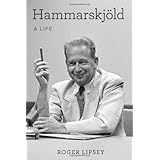
In conversation with Jason the Forsythian when we met in Scotland he was guilty of shameless name-dropping:) He had been in the company of Archbishop Rowan Williams no less, a Christian thinker whose writing is often complex enough to both frustrate and satisfy; frustrating because you know he is saying something important and profound, satisfying because he never short changes the reader by dumbing down, cutting corners, or pretending all the jig saw pieces are even there. His return to academia will I hope mean he will begin to draw together much of his thought into a substantial vision of God enriched from important influences of Eastern and Western theology.
But anyway, Williams mentioned to Jason the new biography of Dag Hammarskjold, and commended it warmly. His blurb is on the dust jacket:
"And admirably judicious and comprehensive – and long overdue – study of one of the most remarkable figures of the twentieth century, whose presence remains both spiritually and politically significant for an age of violently confused international relations."
Another former Archbishop, this time K G Hammar of the Church of Sweden, also commends the volume:
"A great book about a great man who must not be forgotten in a time which more than ever needs to see the footprints of Dag Hammarskjold – the combination of wholehearted engagement in the world and familiarity with the spiritual journey inwards."
My own debt to Hammarskjold goes back to the first reading of Markings, and how many people have to say that. It is a quite extraordinary book, a reservoir of wisdom, deep, fresh, reflecting shimmering sunshine, some blue sky but also clouds and the shadow of mountains. Maybe it would be better described as a Scottish loch then. But the maxims and reflections, the prayers and the psalms, the confessions and thanksgivings, the self critique and the compassionate outwardness, and through it all the sense of the reality of a power that is transcendent, suffusing life with mercy and hopefulness, – through it all, the sense of God.
I've often wondered what a book club would make of it, filled as it is with the heart and the mind of a great human being, part of whose greatness was his own sense of mortality, fallibility and the urgency of what we do with the gift of our life. One of his best known maxims remains true as a reminder to the Church of what its life is about, what its mission is to be:
"In our era, the road to holiness necessarily passes through the world of action."
Yes, and yes again. Lipsey's aim in this biography is to explore the importance of Hammarskjold's inner life as the engine and energy of his outward activities as an humanitarian, diplomat and man of faith caught up in the world of politics, power and international tensions. That small book of markings, found on his bedside table after his death, remains a classic of spiritual honesty, moral striving and the felt tension between disciplined duty and enabling grace from beyond ourselves.
